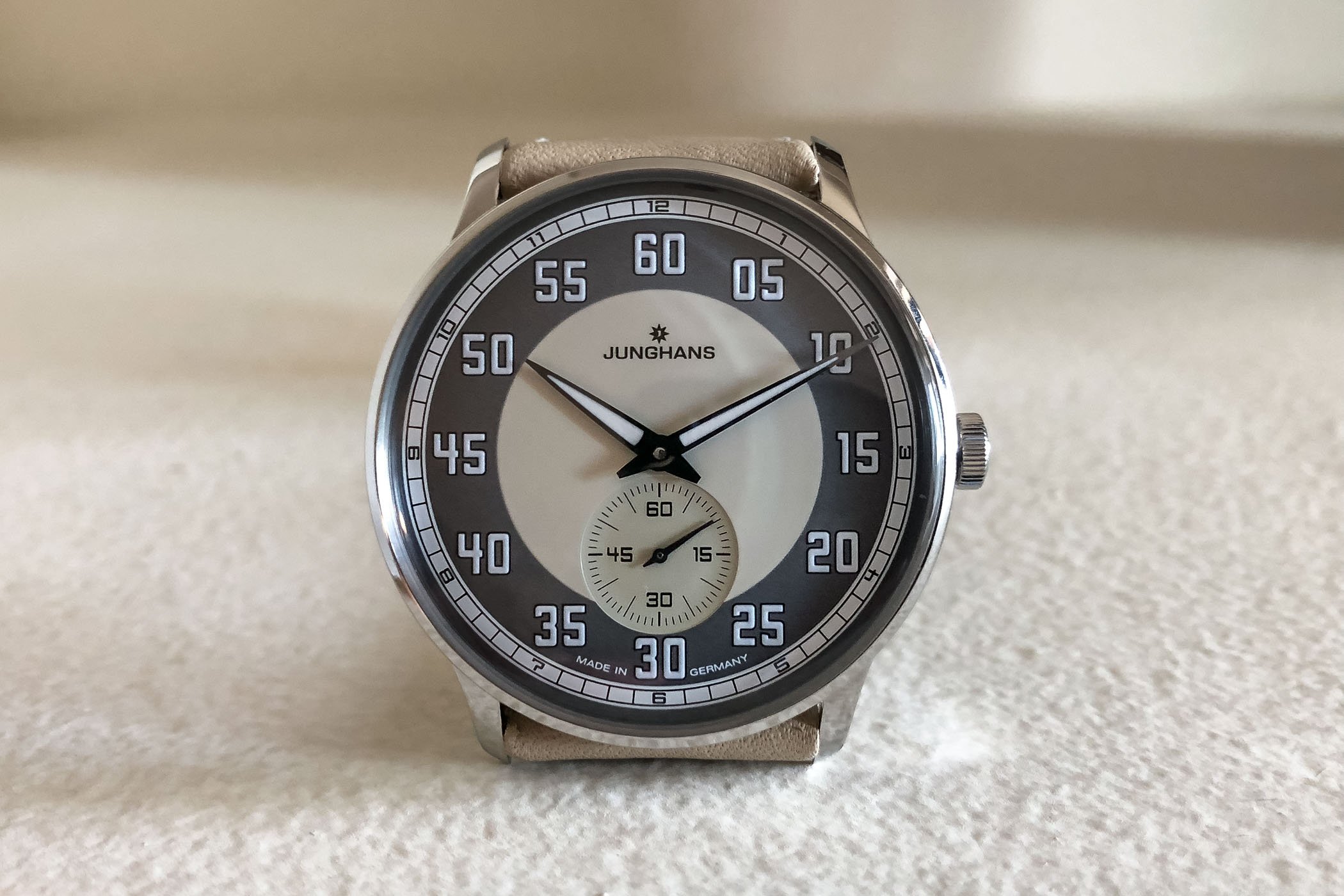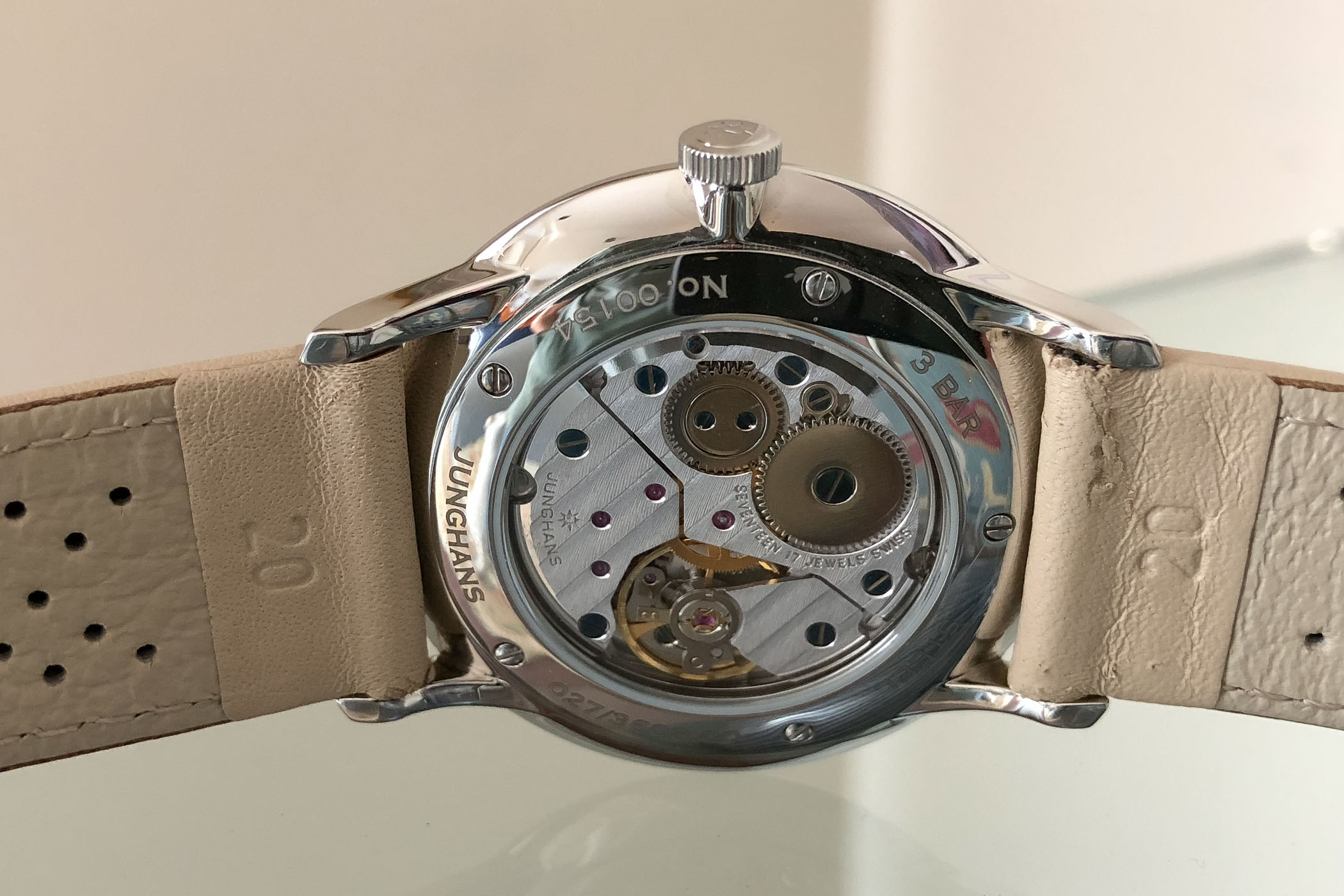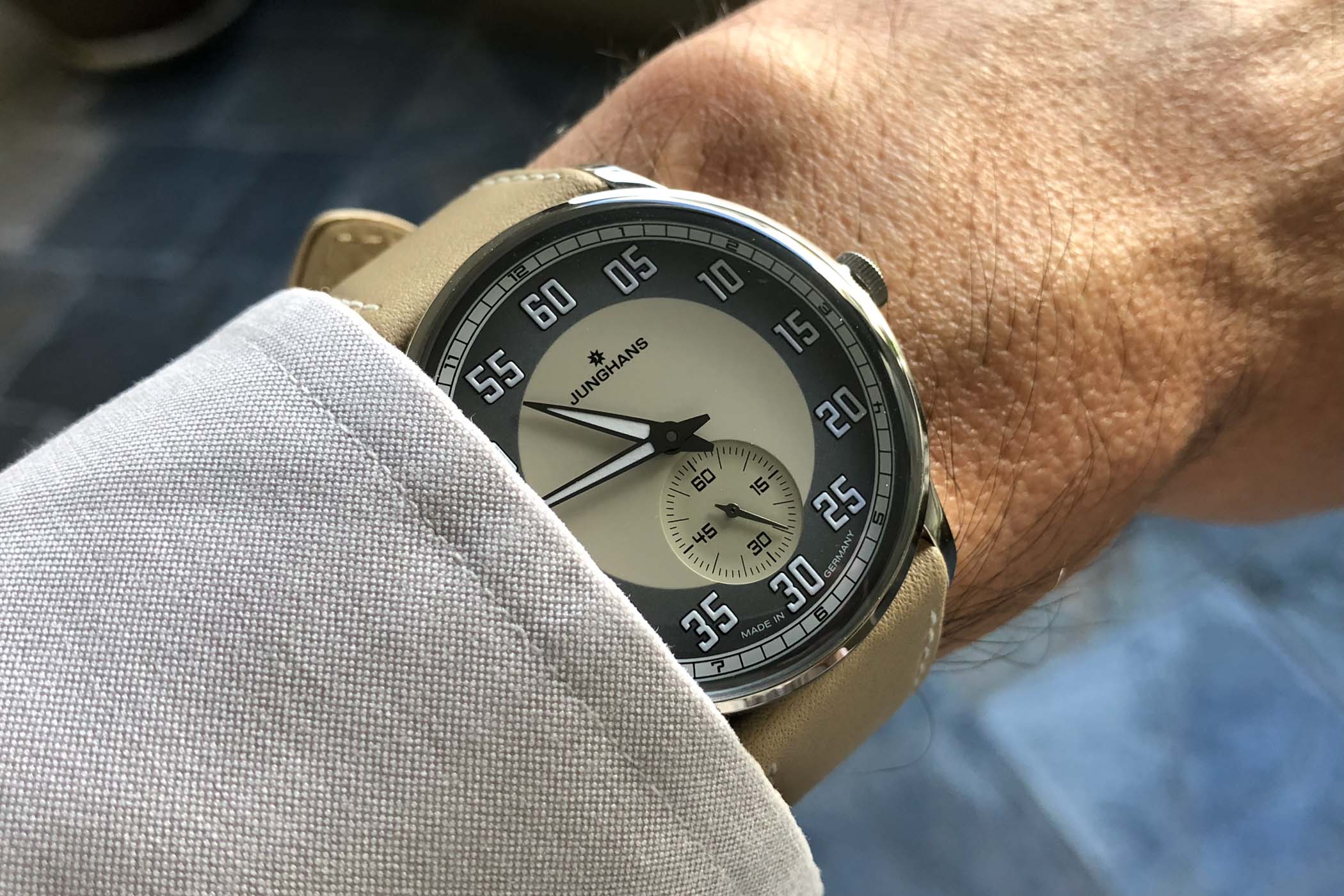Junghans Meister Driver Handaufzug – An Affordable Vintage-Inspired Driver’s Watch
An affordable throwback to an era of hand-assembled supercars.

I recently reviewed the Meister Hand-Winding dress watch from Junghans and was impressed by its price/quality ratio. The German manufacturer has been producing timepieces since 1866 (founded in 1861), so it’s among the oldest registered watch companies in the world. To say Junghans knows a thing or two about producing watches is an understatement, and it has remained true to their founding principles of mass producing timepieces in the most cost-effective way possible. The aforementioned Meister dress watch comes in at only USD 120 more than a comparable Farer Hudson from a microbrand of only a few years. History and provenance have real value when it comes to watches, and Junghans admirably shows restraint when it comes to pricing. The watch I’m reviewing now is another in their Meister line that distinguishes itself with a unique dial and features that draw inspiration from an early 20th-century automobile. Let’s take a closer look at the Junghans Meister Driver Handaufzug.
Background
The love of cars goes back to the company’s original family. Arthur Junghans, son of company founder Erhard Junghans, purchased one of the first test cars from Daimler in 1892. The company also produced car clocks (speed measuring devices in the early days) and the current owners, Hans-Jochem Steim and Hannes Steim, not only collect those but are classic car enthusiasts as well. This passion helped shape the Meister Driver Handaufzug and the design inspiration came from the 1932 German Maybach DS8 Zeppelin. This wasn’t your ordinary car back in the day, more akin to an Aston Martin Rapide S or Rolls-Royce Phantom today. The massive twelve-cylinder engine was praised as being among the most powerful at the time (it could reach over 100mph) and a “younger brother” to the Maybach Zeppelin airship engines. Technological advances in the transmission and clutch system helped distinguish the car even more. Only 25 original vehicles remain in existence today.

The design and coachwork (by renowned coachbuilder Hermann Spohn) were second to none, and attention to detail was paramount. The classic speedometer aesthetic and exterior colour are resurrected in the dial and strap, and although the watch shares a case and movement with the Meister Hand-Winding dress watch, it might as well be from a different line altogether. The Meister Driver Handaufzug is fun and full of character, and brings a vintage racing vibe that car enthusiasts will appreciate. Is it still a dress watch? Perhaps, although it’s anything but reserved and will undoubtedly draw attention to itself if it sneaks out from under a cuff. It would be right at home with a T-shirt and jeans as well.
Case and Design
This is a vintage-inspired watch and both the case and crystal speak to that. At only 37.7mm in diameter, the polished stainless steel case thankfully doesn’t have larger, more modern proportions. It’s just 7.3mm in height as well, so while I wouldn’t quite call it ultra-thin (but really, it’s not far from being that), it will easily slip under the tightest of cuffs. As mentioned in my review of the dress watch, this model wears bigger than the 37.7mm diameter suggests. While a similar piece like the Farer Hudson at 37mm wears a bit small (feeling like a 35mm case), the Meister Driver Handaufzug felt more like 39mm. That doesn’t sound like much of a difference, but in practice it is.
I had criticised the Meister Hand-Winding dress watch for having an acrylic crystal instead of sapphire. It’s a modern dress watch, after all, and suitable for frequent or daily wear. Plexiglas is just too prone to scratches for my liking (even with the SICRALAN coating to make it more durable). That opinion has changed with the Driver. The acrylic completes its vintage vibe and although subtle, reflects the light differently and distorts the dial at sharp angles. This is one of those (very) rare cases in which I actually prefer Plexiglas to sapphire. Some will still find it polarising to find “plastic” on a watch costing north of EUR 1,000, but sometimes art needs to trump science, so to speak.
The case has an exhibition back with mineral glass that’s more resilient than the main crystal. On display is a decorated, hand-wound movement, which is the same as found on the dress watch. The crown is stamped with the company’s eight-point star logo and doesn’t screw down, so the case is only water-resistant to 30m. Rain and splashes are fine but avoid swimming. It’s inspired by a vintage car, not an antique boat.
Dial and hands
The dial is what really differentiates this piece and separates it from the dressier pieces in the Meister line. There are actually two different models, one having a black dial and cream sub-dial (and numerals) with a grey leather strap. I have the piece with a cream dial and sub-dial, and grey outer minute track with white numerals. A white hour track with black printed numerals spans the outermost perimeter. My version, in particular, resembles a vintage speedometer and the cream matches the exterior paint of the classic car. The numerals are filled with a white luminous paint that the company says is environmentally friendly (and certainly not radioactive as in the past).
The seconds sub-dial is at 6 o’clock and has a black hand and black printed numerals at 60, 15, 30 and 45. The minute and hour hands are black and similar in style to the seconds hand, and both have the same white luminous material as the numerals. The company’s name and logo are printed at the top, with MADE IN GERMANY at the bottom (broken up by the 30 numeral). The dial sounds rather simple, but it’s visually striking and leaves a more lasting impression than many dials that are more complicated. The Meister Driver Handaufzug might share DNA with the Meister dress watch, but these are two very different siblings.
Movement
Like the Meister Hand-Winding dress watch, the Meister Driver Handaufzug has a hand-wound J815.1 movement, based on the ETA 7001 Peseux calibre. Handaufzug is actually German for “hand-wound.” The movement has 17 jewels, beats at 21,600vph (3Hz), has sub-dial seconds above 6 o’clock and a 42-hour power reserve. It’s rated at +/- 12 seconds per day, but I averaged less than 10 seconds fast per day. It’s not a certified chronometer, but accurate enough for most enthusiasts. It’s a simple movement without an automatic rotor or complications, and consequently very thin at only 2.5mm in height. This allows the case to be well under 8mm.
When viewed from the mineral glass caseback, the movement is decorated with Côtes de Genève (bridges) and blued screws. It doesn’t have the complexity of a chronograph but is visually appealing nonetheless.
Strap
The 20mm cream leather strap matches the inner dial and original exterior colour of the Maybach DS8 Zeppelin that inspired it. It has a stainless steel buckle with JUNGHANS stamped on the end, and the leather has matching cream stitching. The minimal padding also compliments the thin 7.3mm case well. There are perforations on the back that don’t pierce through the front but help it breathe a little on the wrist.
Similar to the strap on the Meister dress watch, it’s comfortable out of the box without needing a break-in period. My only complaint would be the size. I have small wrists and the strap is one hole short of fitting properly. It still works on my wrist, but I find it just a little too loose. That being said, I would never replace it as the unique colour is a vital part of the overall package.
Conclusion
I enjoyed my time with the Meister Hand-Wound dress watch a few weeks ago, but would only wear it on more formal occasions. There’s nothing wrong with that as it wasn’t aspiring to be anything other than a formal piece. Although the Meister Driver Handaufzug shares the same case and movement, its dial and strap are unique and distinctive enough that I’d happily wear it on a daily basis. It works with both a suit at the office and T-shirt on the beach and is thin and light enough to melt away on your wrist. The glossy Plexiglas crystal is actually a pro this time (a con on the dress model) and I get a kick out of glancing at it every time I’m driving. It’s not often that a simple watch can have such a visual impact, but the design team at Junghans hit this one out of the park.
The Meister Driver Handaufzug sells for EUR 1,170 (USD 1,295), which is more than some other watches with the same ETA 7001 Peseux calibre, but fair for what’s being offered. The unique design, attention to detail and history of the company make a EUR 100 – 200 difference fairly nominal, and it’s probably the closest you’ll ever get to owning an early 20th-century supercar. You can purchase a Meister Driver Handaufzug from Junghans’ website (and here for US customers) or at a participating retailer. Junghans offers a two-year warranty on its mechanical watches.
















2 responses
Lovely, and the perfection of design and purpose serve it really well. I agree, you wouldn’t dream of changing the strap here.
I agree with Edju, very desirable timepiece